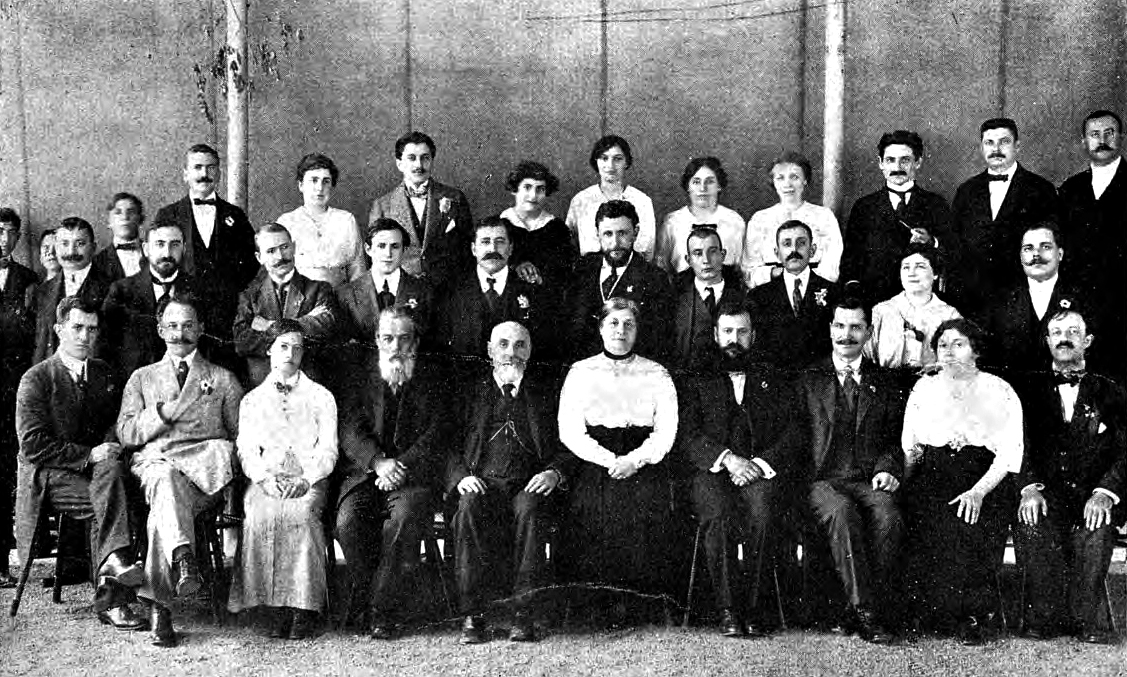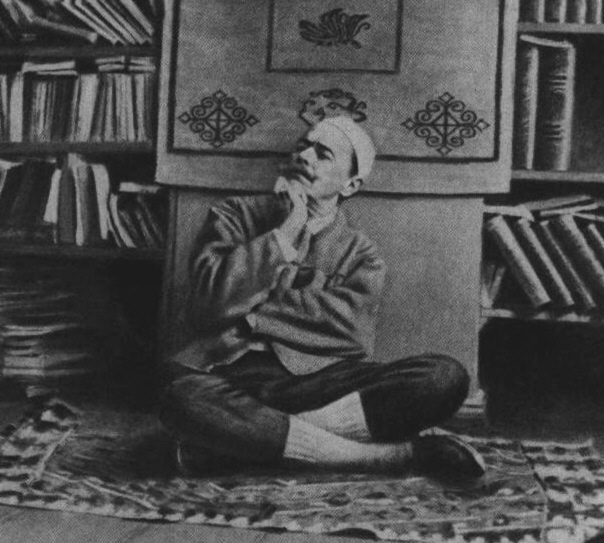|
Ionel Gherea
Ionel Gherea, also known as Ioan Dobrogeanu-Gherea or Ion D. Gherea ( Francized ''J. D. Ghéréa''; 1895 – December 15, 1978), was a Romanian philosopher, essayist, and concert pianist. The son of Constantin Dobrogeanu-Gherea, a Marxist theoretician and critic, and the brother of communist militant Alexandru "Sașa" Gherea, he was only mildly interested in politics of any kind, embracing an apolitical form of left-libertarianism. Largely self-taught, he became interested in the aestheticism of his brother-in-law, Paul Zarifopol, who became one of his main references. As a youth, Zarifopol took him to meet playwright Ion Luca Caragiale and his family, who were also influential on Gherea's writing, and the focus of his old-age memoirs. Gherea's debut as a writer was a 1920 novel written jointly with Luca Caragiale, which was also his only contribution to the genre. Following Constantin's death and Sașa's imprisonment, he had to handle family affairs, but his mismanagement of their ... [...More Info...] [...Related Items...] OR: [Wikipedia] [Google] [Baidu] |
Western Philosophy
Western philosophy encompasses the philosophical thought and work of the Western world. Historically, the term refers to the philosophical thinking of Western culture, beginning with the ancient Greek philosophy of the pre-Socratics. The word ''philosophy'' itself originated from the Ancient Greek (φιλοσοφία), literally, "the love of wisdom" grc, φιλεῖν , "to love" and σοφία '' sophía'', "wisdom"). History Ancient The scope of ancient Western philosophy included the problems of philosophy as they are understood today; but it also included many other disciplines, such as pure mathematics and natural sciences such as physics, astronomy, and biology (Aristotle, for example, wrote on all of these topics). Pre-Socratics The pre-Socratic philosophers were interested in cosmology; the nature and origin of the universe, while rejecting mythical answers to such questions. They were specifically interested in the (the cause or first principle) of the ... [...More Info...] [...Related Items...] OR: [Wikipedia] [Google] [Baidu] |
Paul Zarifopol
Paul Zarifopol (November 30, 1874 – May 1, 1934) was a Romanian literary and social critic, essayist, and literary historian. The scion of an aristocratic family, formally trained in both philology and the sociology of literature, he emerged in the 1910s as a rebel, highly distinctive, voice among the Romanian press and book reviewers. He was a confidant and publisher of the Romanian writer Ion Luca Caragiale, building his theories on Caragiale's already trenchant appraisals of Romanian society and culture. Zarifopol defended art for art's sake even against the Marxism of his father-in-law, Constantin Dobrogeanu-Gherea, and the Poporanism of his friend, Garabet Ibrăileanu. He was also a noted censurer of neoclassical trends, of philistinism, and of inauthentic customs, advocating renewal, but not revolution. A skeptic reviewer of modernist literature, he reemerged during the interwar period as its dedicated promoter, but his preference for literary entertainment over substa ... [...More Info...] [...Related Items...] OR: [Wikipedia] [Google] [Baidu] |
Impressionist Literature
Literary Impressionism is influenced by the European Impressionist art movement, many writers adopted a style that relied on associations. The Dutch Tachtigers explicitly tried to incorporate impressionism into their prose, poems, and other literary works. Much of what has been called "impressionist" literature is subsumed into several other categories, especially Symbolism, its chief exponents being Baudelaire, Mallarmé, Rimbaud, Verlaine and Laforgue. It focuses on a particular character's perception of events. The edges of reality are blurred by choosing points of view that lie outside the norm. Impressionistic literature can basically be defined as when an author centers his story/attention on the character's mental life such as the character's impressions, feelings, sensations and emotions, rather than trying to interpret them. Authors such as Virginia Woolf (''Mrs Dalloway'') and Joseph Conrad (''Heart of Darkness ''Heart of Darkness'' (1899) is a novella by Polish- ... [...More Info...] [...Related Items...] OR: [Wikipedia] [Google] [Baidu] |
National University Of Music Bucharest
The National University of Music Bucharest ( ro, Universitatea Naţională de Muzică București, UNMB) is a university-level school of music located in Bucharest, Romania. Established as a school of music in 1863 and reorganized as an academy in 1931, it has functioned as a public university since 2001. It also offered training in drama until 1950, when this function was taken over by two institutes which were later reunited as the UNATC. Structure The National University of Music is divided into two faculties: the Faculty of Composition, Musicology and Musical Pedagogy and the Faculty of Performing Arts. Administratively, it is divided into the Department of Scientific Research and Artistic Activities, the Department of International Relations and European Programs, the Teacher Training Department, the Music Shows Department, and the Low-Residency Program Department (''see also Education in Romania''). [...More Info...] [...Related Items...] OR: [Wikipedia] [Google] [Baidu] |
Répétiteur
A (from the French verb meaning 'to repeat, to go over, to learn, to rehearse') is an accompanist, tutor or coach of ballet dancers or opera singers. A feminine form, , also appears but is comparatively rare. Opera In opera, a is the person responsible for coaching singers and playing the piano for music and production rehearsals.Oxford English Dictionary Oxford University Press, accessed 27 July 2010 When coaching solo singers or choir members, the ' will take on a number of the roles of a : advising singers on how to improve their pitch and pronunciation, and correcting note or phrasing errors. are skilled musicians who hav ... [...More Info...] [...Related Items...] OR: [Wikipedia] [Google] [Baidu] |
George Enescu
George Enescu (; – 4 May 1955), known in France as Georges Enesco, was a Romanian composer, violinist, conductor and teacher. Regarded as one of the greatest musicians in Romanian history, Enescu is featured on the Romanian five lei. Biography Enescu was born in Romania, in the village of Liveni (later renamed "George Enescu" in his honor), then in Dorohoi County, today Botoșani County. His father was Costache Enescu, a landholder, and his mother was Maria Enescu (née Cosmovici), the daughter of an Orthodox priest. Their eighth child, he was born after all the previous siblings had died in infancy. His father later separated from Maria Enescu and had another son with Maria Ferdinand-Suschi: the painter Dumitru Bâșcu. A child prodigy, Enescu began experimenting with composing at an early age. Several, mostly very short, pieces survive, all for violin and piano. The earliest work of significant length bears the title ''Pămînt românesc'' ("Romanian Land"), and is i ... [...More Info...] [...Related Items...] OR: [Wikipedia] [Google] [Baidu] |
Luca Caragiale
Luca Ion Caragiale (; also known as Luki, Luchi or Luky Caragiale; 3 July 1893 – 7 June 1921) was a Romanian poet, novelist and translator, whose contributions were a synthesis of Symbolism, Parnassianism and modernist literature. His career, cut short by pneumonia, mostly produced lyric poetry with cosmopolitan characteristics, distinct preferences for neologisms and archaisms, and willing treatment of kitsch as a poetic subject. These subjects were explored in various poetic forms, ranging from the conventionalism of ''formes fixes'', some of which were by then obsolete, to the rebellious adoption of free verse. His poetry earned posthumous critical attention and was ultimately collected in a 1972 edition, but sparked debates among literary historians about the author's contextual importance. The son of dramatist Ion Luca Caragiale and the half-brother of writer Mateiu Caragiale, Luca also became the son-in-law of communist militant Alexandru Dobrogeanu-Gherea. It was with Al ... [...More Info...] [...Related Items...] OR: [Wikipedia] [Google] [Baidu] |
Ion Luca Caragiale
Ion Luca Caragiale (; commonly referred to as I. L. Caragiale; According to his birth certificate, published and discussed by Constantin Popescu-Cadem in ''Manuscriptum'', Vol. VIII, Nr. 2, 1977, pp. 179-184 – 9 June 1912) was a Romanian playwright, short story writer, poet, theater manager, political commentator and journalist. Leaving behind an important cultural legacy, he is considered one of the greatest playwrights in Romanian language and literature, as well as one of its most important writers and a leading representative of local humour. Alongside Mihai Eminescu, Ioan Slavici and Ion Creangă, he is seen as one of the main representatives of ''Junimea'', an influential literary society with which he nonetheless parted during the second half of his life. His work, spanning four decades, covers the ground between Neoclassicism, Realism, and Naturalism, building on an original synthesis of foreign and local influences. Although few in number, Caragiale's plays constitu ... [...More Info...] [...Related Items...] OR: [Wikipedia] [Google] [Baidu] |
Aestheticism
Aestheticism (also the Aesthetic movement) was an art movement in the late 19th century which privileged the aesthetic value of literature, music and the arts over their socio-political functions. According to Aestheticism, art should be produced to be beautiful, rather than to serve a moral, allegorical, or other didactic purpose, a sentiment exemplified by the slogan "art for art's sake." Aestheticism originated in 1860s England with a radical group of artists and designers, including William Morris and Dante Gabriel Rossetti. It flourished in the 1870s and 1880s, gaining prominence and the support of notable writers such as Walter Pater and Oscar Wilde. Aestheticism challenged the values of mainstream Victorian culture, as many Victorians believed that literature and art fulfilled important ethical roles. Writing in ''The Guardian'', Fiona McCarthy states that "the aesthetic movement stood in stark and sometimes shocking contrast to the crass materialism of Britain in t ... [...More Info...] [...Related Items...] OR: [Wikipedia] [Google] [Baidu] |

.jpg)


